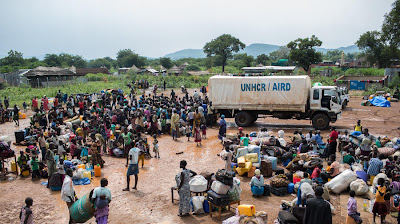The most significant cross-border movements in the region have been Sudanese fleeing to Chad, and South Sudanese refugees returning to South Sudan
United Nations High Commissioner for Refugees (UNHCR), the UN Refugee Agency, is scaling up to assist people seeking safety in countries neighbouring Sudan, where the fighting looks set to trigger further displacement both within and outside the country.
So far, the most significant cross-border movements in the region have been Sudanese fleeing to Chad, and South Sudanese refugees returning to South Sudan. While we have also received reports of people starting to arrive in Egypt, exact numbers are not available at this point.
Some of the population movements we expect to observe in the coming days include outflows of new Sudanese refugees to neighbouring countries, returns of refugees who were being hosted by Sudan, and movements of other refugees being hosted by Sudan to other neighbouring countries.
UNHCR is working closely with partners and governments in the region to assess the needs of the newly arrived and to prepare a joint response. We thank them for continuing to keep their borders open to those fleeing Sudan – whether to seek international protection or to return to their countries of origin.
In Chad, UNHCR and its partners have deployed emergency teams along the eastern border with Sudan to respond to urgent needs for protection and humanitarian assistance. The Government of Chad and UNHCR have initiated pre-registration activities to identify new arrivals and assess their needs. Since the beginning of the fighting, at least 20,000 refugees have fled across the border into Chad. Many are located in villages only 5km away from Sudan, and more are expected to arrive in the coming days.
UNHCR is also bolstering supplies of core relief items, including sleeping mats, soap and cooking utensils, for 20,000 refugees. Refugees are sheltering under trees and lack clean water and food.
Planning is underway to relocate families to an existing refugee camp further from the border, while a new location is being identified to host additional arrivals. More than 400,000 Sudanese refugees are already hosted across 13 camps and among local communities in eastern Chad.
In South Sudan, UNHCR teams, with partners, have been at border crossing points to monitor new arrivals and provide help. To date, we have registered nearly 4,000 South Sudanese that have crossed from Sudan, mostly through the Renk border crossing point in Upper Nile State. It is possible that more are arriving through informal border crossings.
Many of those who have arrived have had the means to pay for transportation from Khartoum and to continue their travel inside South Sudan. They have told our teams that a large number of fellow nationals are trying to reach the border on foot. Figures of those on their way to South Sudan are difficult to confirm. However, there has been a daily increase in arrivals in Renk. It is likely that those arriving on foot will be more vulnerable and have greater needs than the early arrivals.
There are over 800,000 South Sudanese refugees in Sudan, a quarter of whom are in Khartoum and directly affected by the fighting.
To support local and national authorities, UNHCR is setting up reception centres at the border in South Sudan for emergency registration and identification of vulnerable arrivals and to distribute some basic relief items, like clean water. We are working with partners to set up telecommunications facilities at the border so that new arrivals can contact their families to facilitate onward travel.
Most of those returning are expected to go back to parts of the country that are extremely fragile as a result of conflict, climate change or food insecurity – or a combination of all three.
South Sudan is already suffering a major humanitarian crisis. The country has more than 2.3 million internally displaced people; almost three quarters of the population is in need of humanitarian assistance; and 2.2 million South Sudanese are refugees in neighbouring countries. UNHCR is seriously concerned that a large, unplanned number of new returns may destabilize already struggling local communities.
The humanitarian impact of this crisis will be harsh. Sudan hosts more than 1 million refugees and 3.7 million internally displaced people (IDPs). Assistance programmes that were already overstretched are now severely hampered.
All UNHCR operations in Sudan’s neighbouring countries impacted by this new emergency already have existing large refugee and IDP populations and are also severely underfunded. Urgent support is needed to ensure timely assistance is provided to those fleeing hostilities.
SOURCE
United Nations High Commissioner for Refugees (UNHCR)













